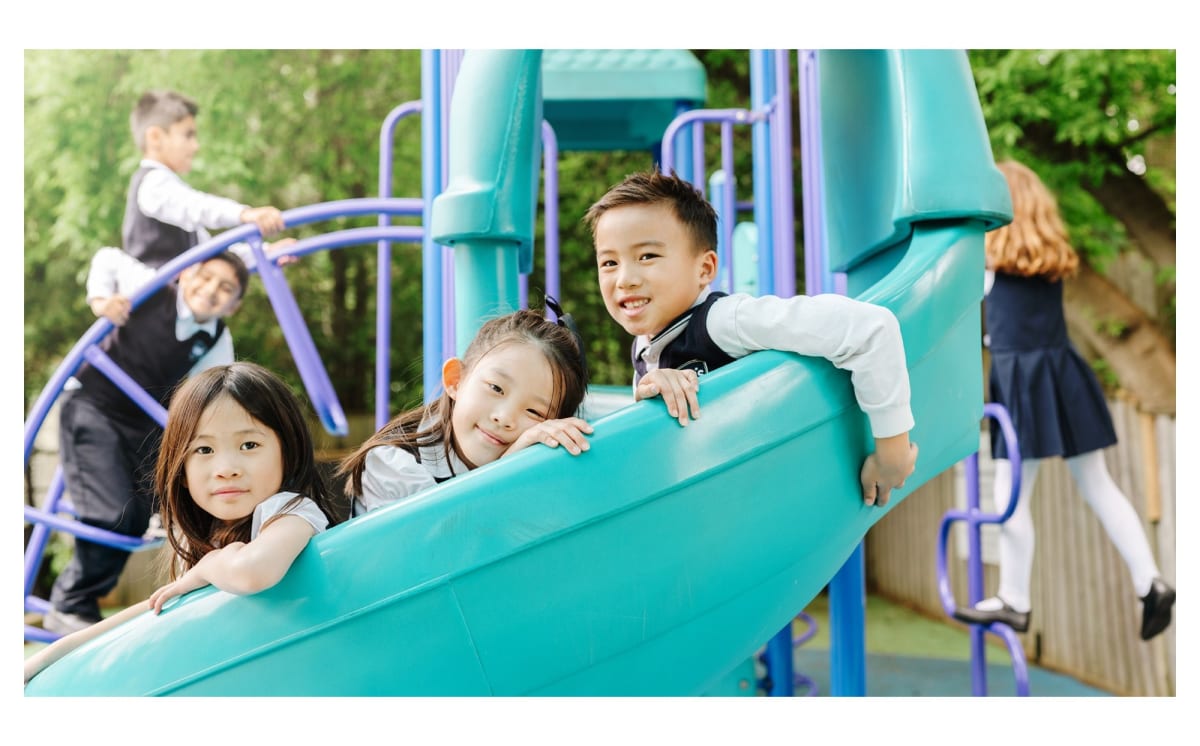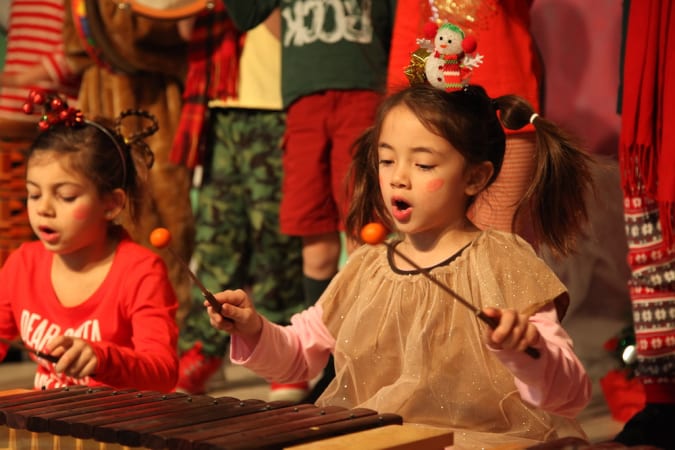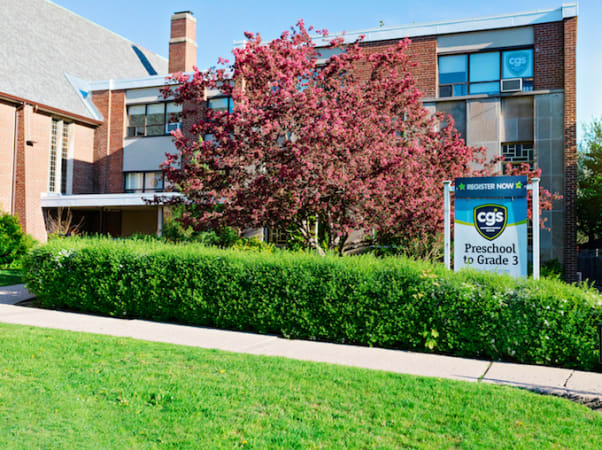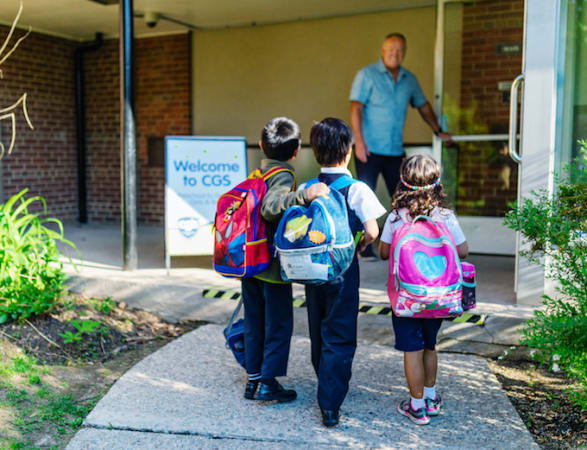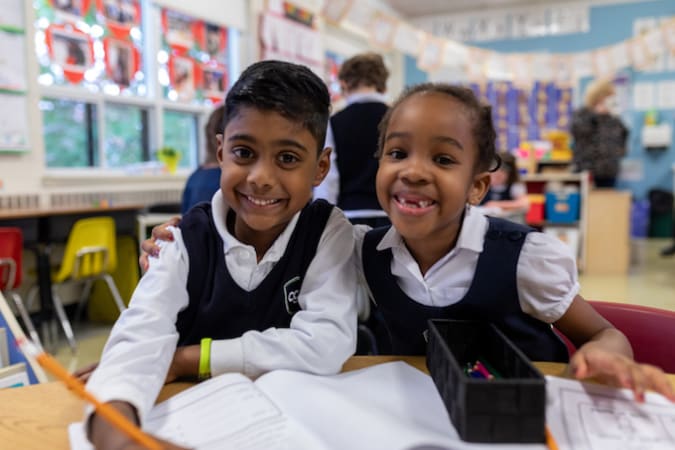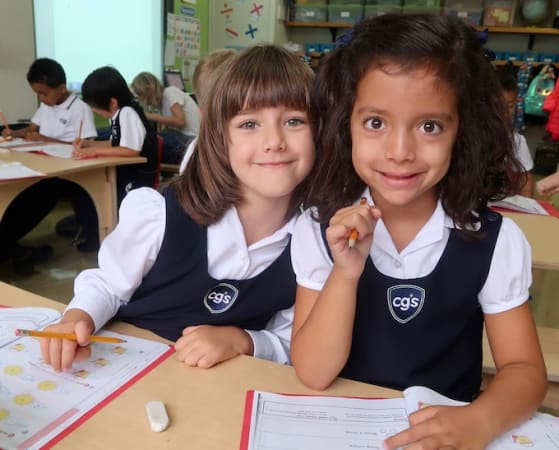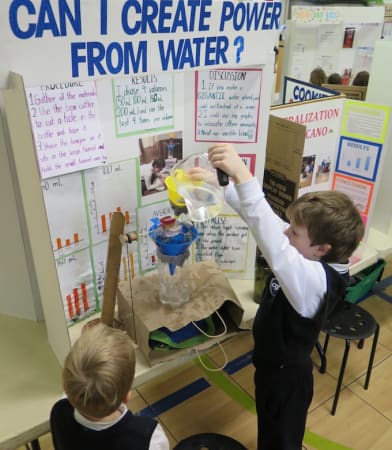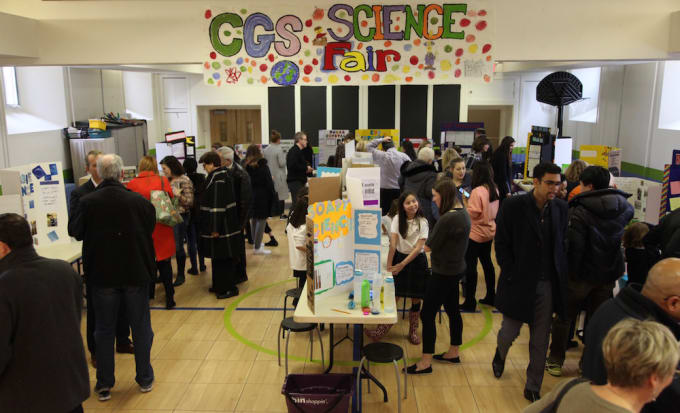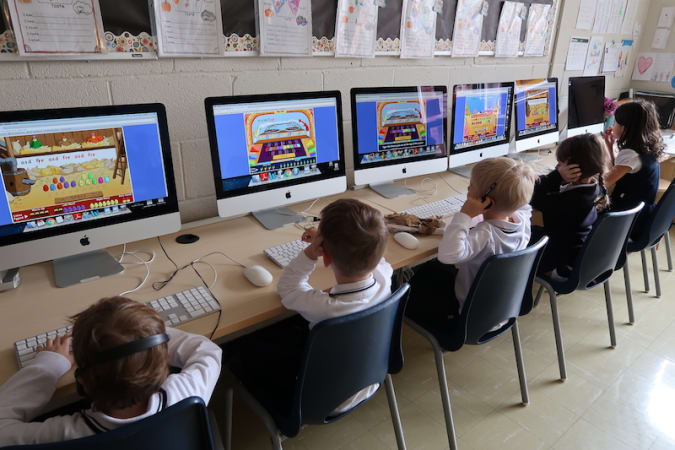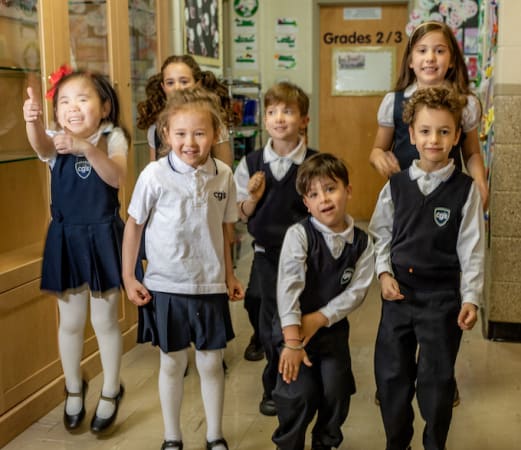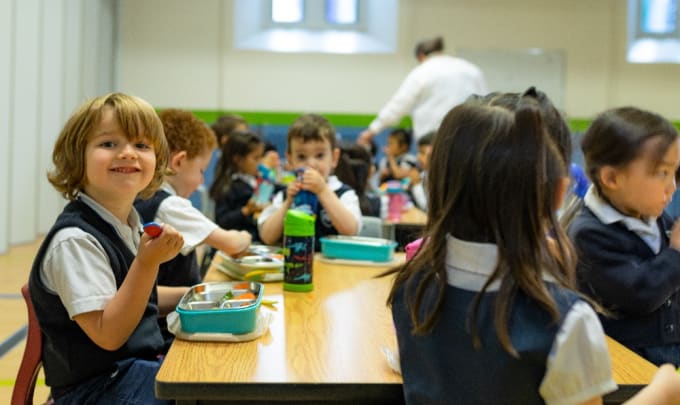Pages in this report:
Select report page
Reviews
Academics
Student Body
Tuition
Admissions
Grades Gender Class Size Tuition Language of instruction Associations Enrolment Curriculum Traditional & Reggio Emilia EBROCHURE
School address
670 Eglinton Avenue East , Toronto , Ontario , M4G 2K4 (MAP)
Our Perspective
How we see CGS (Children's Garden School)
CGS was founded in 1986 by Marie Bates, who remains as the principal at the school today. As that suggests, the school has remained very true to the founders’ initial intentions, namely to create a place that provides a strong academic foundation in a caring, open, and supportive environment. While reading, writing, and numeracy are key—just as they should be—so is the development of creativity and social engagement. Bates believes that children learn as much in music class as they do in math class, and she’s right of course. As such, the program promotes links across the curriculum, allowing children to see those connections while also broadening their horizons of interest. The strength of the program is reflected by the reputation that CGS has earned over the thirty-plus years of its life.
School's Perspective
Compare with:
Select school A+ Academy of Advancement
ABC Montessori
Aberdeen Hall Preparatory School
Académie de la Capitale
Académie St-Laurent Academy
Académie Westboro Academy
Academie Providence
Academy for Gifted Children - P.A.C.E.
Academy of Thought and Industry Toronto
Adelfiha Christian Academy
Agate Private School
AIM Without Limits
Albert College
Alcuin College
Alexander Academy
Alexander von Humboldt German International School
Alive Montessori & Private School
Appleby College
Applewood Academy for Progressive Learning
Arrowsmith School
Ashbury College
Ashwood Glen
Astolot Educational Centre
Athol Murray College of Notre Dame
Aurora Alternative Micro School
Aurora Montessori School
Aurora Preparatory Academy
Avalon Children's Montessori School
AVRO Academy
École Montessori
Balmoral Hall School
Banbury Crossroads Academy
Banbury Crossroads School
Bannockburn
Bayview Glen
Bishop Hamilton Montessori School
Bishop's College School
Blue Butterfly Montessori School
Blyth Academy Etobicoke
Blyth Academy Lawrence Park
Blyth Academy Mississauga
Blyth Academy The Glebe, Ottawa
Bodwell High School
Bond Academy
Braemar House School
Brampton Christian School
Branksome Hall
Brentwood College School
Brighton School
Brockton School
Brookes Westshore
Calgary Academy & Calgary Collegiate
Calgary French & International School
Calgary Waldorf School
Cambridge International Academy
Canadian College Italy
Carmel New Church School
Centennial Academy
Central Montessori Schools
Century Private School
Chaoyin Bilingual School
Children's Garden Nursery School
Chisholm Academy
Christ Church Cathedral School
Christian Virtual School
Clanmore Montessori School
Claren Academy
Clear Water Academy
College Bourget
College Prep International
Collingwood School
Columbia International College
Community Life Christian School
Cornerstone Montessori Prep School
Crawford Adventist Academy
Crescent School
Crestwood Preparatory College
Crestwood School
Curlew Montessori School
De La Salle College
Dearcroft Montessori School
Delano Academy & Delano High
Dewey Institute
DMS Montessori Preschool and Daycare Inc.
Durham Elementary, Durham Academy and G.B.M.S.
Eastgate Academy
Edelweiss Private Academy
Elevate Learning Centre
Elmwood School
Enquiring Minds Montessori
Erudite Private School
Explore Nature
Fern Hill School - Burlington
Fern Hill School - Oakville
Fern Hill School - Ottawa
Fieldstone School
Foothills Academy
Fort Erie International Academy
Fredericton Montessori Academy
Free Spirit Montessori Downtown
French Elite Montessori
German International School Toronto
Glarea Elevated Learning
Glen Briar Academy
Glenlyon Norfolk School
Glenmore Christian Academy
GlenOak Academy
Greenwood College School
Guidepost Montessori
Guiding Light Academy
Halton Waldorf School
Hamilton District Christian High
Hatch House Montessori School
Haven International School
Havergal College
Hawthorn School
Head Start Montessori School
Heritage Academy of Learning Excellence
Hillfield Strathallan College
Hitherfield School
Holy Name of Mary College School
Holy Trinity School
HongDe Elementary School
Howlett Academy
HTS Online
Hudson College
Humberside Montessori School
IMG Academy
InnovOak School
Island Pacific School
J. Addison School
Jehovah Jireh Christian School
Joan of Arc Academy | Academie Jeanne d'Arc
Junior Academy
Kaban Montessori School
Kanata Montessori
Kells Academy
Kempenfelt Bay School
Kendellhurst Academy
Keystone School
King's Christian Collegiate
King's College School for Bright and Gifted Children
King's-Edgehill School
Kingsley Primary School
Kingsway College School
Kuper Academy
La Citadelle International Academy of Arts & Science
La Maison Montessori House
La Villa Montessori School
Lakefield College School
Laureate College
Lauremont School
Learning Beam Academy
Lee Academy
Leonardo Da Vinci Academy of Arts & Sciences
Linbrook School
London International Academy
Lowell High School
Lower Canada College
Luther College High School
Lycée Claudel
Lycée Français de Toronto
Lycée international de Calgary
Lynn-Rose School
MacLachlan College – Lower School Campus
MacLachlan College – Upper School Campus
Magnificent Minds
March Academy
McDonald International Academy
Meadow Green Academy
Meadowridge School
Mennonite Collegiate Institute
Mentor College
Merrick Preparatory School
Metropolitan Preparatory Academy
Miss Edgar's & Miss Cramp's School
Monarch Academy
Montcrest School
Montessori House of Children
Montessori Learning Centre of Pickering
Mulgrave School
Nancy Campbell Academy
Newton’s Grove School
Niagara Christian Collegiate
Nile Academy
NOIC Academy
North Bay High School
North Point School
North Star Academy
North Star Montessori Elementary School
North Toronto Christian School
Northmount School
Northstar Montessori Private School
Oak Bridge Academy
Oak Learners
Oakville Christian School (OCS)
Oakwood Academy
Olivet School
OMS Montessori
Ontario eSecondary School
Ontario Virtual School
Ottawa Victory Christian Academy
Oxford Learning Academy (Private School)
Passages Centre for Self-Directed Learning
Pear Tree School
Peel Montessori School
Peoples Christian Academy (PCA)
Pickering College
Prestige School - Richmond Hill Campus
Prestige School - Toronto Campus
Prince Edward Montessori School
Progressive Academy
Purcell Collegiate School
Pythagoras Academy
Queen Margaret's School
Quo Vadis Elementary School
Revel Academy
Richland Academy
Richmond Hill Christian Academy
Richmond Hill Montessori Private School
Ridley College
River Valley School
Robert Land Academy
Rockway Mennonite Collegiate
Rosseau Lake College
Rosthern Junior College High School
Rotherglen School - Mississauga
Rotherglen School - Oakville
Rothesay Netherwood School
Rotman Arts and Science School
Rowntree Montessori Schools (RMS)
Royal Cachet Montessori School
Royal Crown School
Royal St. George's College
Rundle Academy & Rundle Studio
Rundle College
Rutherford Private School
Sacred Heart School of Halifax
Sathya Sai School of Toronto
Scholars’ Hall
Seneca Hill Private School
Shawnigan Lake School
Shepherd Montessori Private Catholic School
Sherwood Heights School
Sidney Ledson Institute
Somerset Academy
Southpointe Academy
St. Andrew's College
St. Anne's School
St. Clement's Early Learning School
St. Clement's School
St. George's School
St. George's School of Montreal
St. John's-Kilmarnock School
St. John's-Ravenscourt School
St. Jude's Academy
St. Margaret's School
St. Michael's College School
St. Michaels University School
St. Mildred's-Lightbourn School
St. Stephen's School, Rome
Stanstead College
Star Academy
Stratford Hall
Strathcona-Tweedsmuir School
Sudbury Christian Academy
Summit Micro School
Sunflower Early Learning Society
Sunnybrook School
Sunrise Montessori School
Tapply Binet College
TEAM School
TFS - Canada's International School
TFS - Canada's International School (West Campus)
The Abelard School
The Bishop Strachan School
The Children's House Montessori School
The Claremont School
The Clover School
The Cole Academy
The Country Day School
The Dalton School
The Dunblaine School
The Element High School
The Giles School
The Gow School
The Hill Academy
The Learning Common
The Linden School
The Mabin School
The Maples Academy
The Priory School
The Rosedale Day School
The Sacred Heart School of Montreal
The Sterling Hall School
The Study
The Study Academy
The Sycamore School
The YMCA Academy
The York School
Thetford Academy
Third Academy
Toronto District Christian High School
Toronto French Montessori
Toronto Prep School
Toronto STEM School
Toronto Waldorf School
Town Centre Private Schools
Trafalgar Castle School
Trafalgar Ridge Montessori School
Trafalgar School For Girls
Trillium School
Trinity College School
Trinity Montessori School
Unionville Academy
Unionville College
Unisus School
University of Toronto Schools
Upper Canada College
ursa
Vancouver Independent School for Science and Technology
Vaughan College Private School
Vianney Academy
Villanova College
Vincent Massey Academy
Virtual High School
Walden International School
Waldorf Academy
Webtree Academy
Wesley Christian Academy
West Island College (Calgary)
West Island College (Montreal)
Western Heights Montessori Academy
Westmont Montessori School
Westside Montessori School
Wheatley School
Whytecliff Agile Learning Centre - Burnaby
Whytecliff Agile Learning Centres
Willowbrook Heights
WillowWood School
Wise Owl Private School
Wishing Well Schools
Woodland Christian High School
Yip’s Music & Montessori School
How CGS (Children's Garden School) sees itself
The school administration answered our questions
Who are you, as a school?
"Since 1986, a balanced education has been the foundation of our program. CGS is Leaside's junior preparatory, co-ed private school of choice for Pre-Kindergarten through Grade 4. We emphasize a strong academic foundation with a thoughtful focus on social-emotional skills. Our early phonics and pre-reading programs lead to high levels of literacy. Highlights: French, Music, Art, Drama, Public Speaking, Character Ed, Mindfulness, Outdoor Ed, and Physical Fitness, with optional Mandarin. CGS keeps the heart in education."
Specializing in the critical early years of education (Pre-K - Grade 4) since 1986. Co-ed, non-denominational nurturing environment; a 'home away from home' for your child. French four times per week/Extended French after school program. Mindfulness practices throughout the week. Respected within the Independent School community. Focus on public speaking, leadership and exceptional performance arts and visual arts opportunities. Gymnastics, skating and swimming curriculum for Grades 1-4. Outdoor Education Trips to UCC's Norval Centre every year for JK-Grade 4. Exceptionally active, welcoming and positive Parent Association and community. Real Food For Real Kids hot lunch available.
What do you do differently and uniquely well?
"The trademark of a CGS student is their strong academic foundation, balanced by their joyful discovery and curious exploration of a love for learning through specialty classes like language, visual art, music/drama, mindfulness, and physical education. Our highly acclaimed Language Arts Program, (reading and phonics) and Touch Math begin with our preschool students, and uniquely ensure each child is ready for a smooth and successful transition into our, or any, competitive school-age curriculum"
What type of student is a good fit for your school?
"The type of student to thrive at CGS is the child of a family who wants to be partners with our school, our educators and our administrative team. Our young students are just starting out on their educational journey, so our expectation at this age is reflective of the family, and how their values and expectations align with our own."
To your knowledge, why do families choose your school over others?
"Our Early Start/Preschool, (2.5-4 yrs of age), builds the foundation for success by preparing our youngest student for their educational journey. This high-quality and balanced introduction to academics yields sustained benefits for our youngest learners as we focus on supporting the development of the whole child; addressing cognitive, social, emotional and physical learning. CGS creates a love for learning while fostering the necessary skills of a 21st century learner."
What aspect of your school is underappreciated?
"Our small school advantage, and the welcoming sense of community each time you enter our building. At CGS, we are known for our academic focus, yet the balance of arts, character building, extracurriculars, and physical education are something that families find astounding about our curriculum. Our days are carefully balanced with a thoughtful focus on reading, math, and language plus mindfulness, social-emotional learning, and a collaborative environment to develop positive relationships."
What might families find surprising about your school?
"Our educators are committed to our school; some with 15+ years at CGS! We know the value in a consistent and experienced team of familiar-faced educators/support staff who deliver current and contemporary educational approaches in their classrooms. Our seasoned team of classroom educators also offer after-school tutoring, and exposure to a variety of after-school clubs to support students' special interests, such as robotics, dance, games, language and leadership opportunity."
School gallery
×
No additional photos or videos
Photo-tour of facilities
Athletics facilities
Our playground has areas of activity and areas of calm, depending on what you choose each day.
Arts facilities
Music and theatre come together for the Holiday Concert.
Our annual musical takes to the stage in May.
Displaying work at the Art Fair.
Campus
The view from our front lawn.
Happy parents on the first day of school.
Morning arrival.
Classrooms
Phonics in SK.
Time for Math in Grade 1.
Science facilities
Can I create power from water? Grade 2 Science Fair project.
Parents and students enjoy the annual Science Fair.
Instructional resources
SK students in the Computer Lab working on their keyboarding skills with Dance Mat Typing.
JK butterflies released in the garden.
SMART Board phonics in JK.
Shared spaces
Dance Party Friday always spills into the hallway.
Lunchtime for Early Start (preschool) in the gym.
Our library is well-loved by students.
×
×
Insider Perspectives
How people from the school’s community see CGS (Children's Garden School)
Video reviews of CGS (Children's Garden School)
Watch our parent interview with Bessie Mitrakos to get the inside scoop on what it’s like to have a child attend CGS (Children's Garden School).
Written reviews of CGS (Children's Garden School)
My husband and I couldn't be happier about our decision to send our 3 year old son to CGS. He has ha...
My kids enjoy the nurturing and encouraging school atmosphere created by the teachers and staffs at ...
We had 3 children go through CGS and each loved being able to do things that young children aren't n...
See all written reviews (4 total)
School leadership
Top-down influence on the school’s direction and tone
Message from school leadership
Marie Bates, Principal and Founder
Thank you for your interest in our school. CGS has been a home away from home for so many children, and their families, since it was founded in 1986. We pride ourselves on getting to know each child, to the fullest extent possible, while they are with us. Our young students, from Preschool to Grade 4 are protected, cherished, motivated and inspired during the first, and all important, years of their formal education. When you truly know your students it is easy to do what is best for them.
We are committed to our small class sizes and balanced curriculum. We believe that children can learn as much in Music class as they can in Math class. Along with our strong core curriculum, students are given the opportunity to immerse themselves in the arts and physical activity. Our goal is to provide an education that is rich and diverse by placing importance on all aspects of a wide and varied curriculum.
As founding Principal, I have been honoured to work with, and support, a staff that is known for their dedication and commitment to the CGS philosophy. Each and every student is celebrated for who they are. Our teachers deliver an exceptional program while keeping the heart in education. Please visit our website and see what makes CGS the special place it is.
THE OUR KIDS REPORT: CGS (Children's Garden School)
Next steps to continue your research:
Add to shortlist
Compare this school with... A+ Academy of Advancement
ABC Montessori
Aberdeen Hall Preparatory School
Académie de la Capitale
Académie St-Laurent Academy
Académie Westboro Academy
Academie Providence
Academy for Gifted Children - P.A.C.E.
Academy of Thought and Industry Toronto
Adelfiha Christian Academy
Agate Private School
AIM Without Limits
Albert College
Alcuin College
Alexander Academy
Alexander von Humboldt German International School
Alive Montessori & Private School
Appleby College
Applewood Academy for Progressive Learning
Arrowsmith School
Ashbury College
Ashwood Glen
Astolot Educational Centre
Athol Murray College of Notre Dame
Aurora Alternative Micro School
Aurora Montessori School
Aurora Preparatory Academy
Avalon Children's Montessori School
AVRO Academy
École Montessori
Balmoral Hall School
Banbury Crossroads Academy
Banbury Crossroads School
Bannockburn
Bayview Glen
Bishop Hamilton Montessori School
Bishop's College School
Blue Butterfly Montessori School
Blyth Academy Etobicoke
Blyth Academy Lawrence Park
Blyth Academy Mississauga
Blyth Academy The Glebe, Ottawa
Bodwell High School
Bond Academy
Braemar House School
Brampton Christian School
Branksome Hall
Brentwood College School
Brighton School
Brockton School
Brookes Westshore
Calgary Academy & Calgary Collegiate
Calgary French & International School
Calgary Waldorf School
Cambridge International Academy
Canadian College Italy
Carmel New Church School
Centennial Academy
Central Montessori Schools
Century Private School
Chaoyin Bilingual School
Children's Garden Nursery School
Chisholm Academy
Christ Church Cathedral School
Christian Virtual School
Clanmore Montessori School
Claren Academy
Clear Water Academy
College Bourget
College Prep International
Collingwood School
Columbia International College
Community Life Christian School
Cornerstone Montessori Prep School
Crawford Adventist Academy
Crescent School
Crestwood Preparatory College
Crestwood School
Curlew Montessori School
De La Salle College
Dearcroft Montessori School
Delano Academy & Delano High
Dewey Institute
DMS Montessori Preschool and Daycare Inc.
Durham Elementary, Durham Academy and G.B.M.S.
Eastgate Academy
Edelweiss Private Academy
Elevate Learning Centre
Elmwood School
Enquiring Minds Montessori
Erudite Private School
Explore Nature
Fern Hill School - Burlington
Fern Hill School - Oakville
Fern Hill School - Ottawa
Fieldstone School
Foothills Academy
Fort Erie International Academy
Fredericton Montessori Academy
Free Spirit Montessori Downtown
French Elite Montessori
German International School Toronto
Glarea Elevated Learning
Glen Briar Academy
Glenlyon Norfolk School
Glenmore Christian Academy
GlenOak Academy
Greenwood College School
Guidepost Montessori
Guiding Light Academy
Halton Waldorf School
Hamilton District Christian High
Hatch House Montessori School
Haven International School
Havergal College
Hawthorn School
Head Start Montessori School
Heritage Academy of Learning Excellence
Hillfield Strathallan College
Hitherfield School
Holy Name of Mary College School
Holy Trinity School
HongDe Elementary School
Howlett Academy
HTS Online
Hudson College
Humberside Montessori School
IMG Academy
InnovOak School
Island Pacific School
J. Addison School
Jehovah Jireh Christian School
Joan of Arc Academy | Academie Jeanne d'Arc
Junior Academy
Kaban Montessori School
Kanata Montessori
Kells Academy
Kempenfelt Bay School
Kendellhurst Academy
Keystone School
King's Christian Collegiate
King's College School for Bright and Gifted Children
King's-Edgehill School
Kingsley Primary School
Kingsway College School
Kuper Academy
La Citadelle International Academy of Arts & Science
La Maison Montessori House
La Villa Montessori School
Lakefield College School
Laureate College
Lauremont School
Learning Beam Academy
Lee Academy
Leonardo Da Vinci Academy of Arts & Sciences
Linbrook School
London International Academy
Lowell High School
Lower Canada College
Luther College High School
Lycée Claudel
Lycée Français de Toronto
Lycée international de Calgary
Lynn-Rose School
MacLachlan College – Lower School Campus
MacLachlan College – Upper School Campus
Magnificent Minds
March Academy
McDonald International Academy
Meadow Green Academy
Meadowridge School
Mennonite Collegiate Institute
Mentor College
Merrick Preparatory School
Metropolitan Preparatory Academy
Miss Edgar's & Miss Cramp's School
Monarch Academy
Montcrest School
Montessori House of Children
Montessori Learning Centre of Pickering
Mulgrave School
Nancy Campbell Academy
Newton’s Grove School
Niagara Christian Collegiate
Nile Academy
NOIC Academy
North Bay High School
North Point School
North Star Academy
North Star Montessori Elementary School
North Toronto Christian School
Northmount School
Northstar Montessori Private School
Oak Bridge Academy
Oak Learners
Oakville Christian School (OCS)
Oakwood Academy
Olivet School
OMS Montessori
Ontario eSecondary School
Ontario Virtual School
Ottawa Victory Christian Academy
Oxford Learning Academy (Private School)
Passages Centre for Self-Directed Learning
Pear Tree School
Peel Montessori School
Peoples Christian Academy (PCA)
Pickering College
Prestige School - Richmond Hill Campus
Prestige School - Toronto Campus
Prince Edward Montessori School
Progressive Academy
Purcell Collegiate School
Pythagoras Academy
Queen Margaret's School
Quo Vadis Elementary School
Revel Academy
Richland Academy
Richmond Hill Christian Academy
Richmond Hill Montessori Private School
Ridley College
River Valley School
Robert Land Academy
Rockway Mennonite Collegiate
Rosseau Lake College
Rosthern Junior College High School
Rotherglen School - Mississauga
Rotherglen School - Oakville
Rothesay Netherwood School
Rotman Arts and Science School
Rowntree Montessori Schools (RMS)
Royal Cachet Montessori School
Royal Crown School
Royal St. George's College
Rundle Academy & Rundle Studio
Rundle College
Rutherford Private School
Sacred Heart School of Halifax
Sathya Sai School of Toronto
Scholars’ Hall
Seneca Hill Private School
Shawnigan Lake School
Shepherd Montessori Private Catholic School
Sherwood Heights School
Sidney Ledson Institute
Somerset Academy
Southpointe Academy
St. Andrew's College
St. Anne's School
St. Clement's Early Learning School
St. Clement's School
St. George's School
St. George's School of Montreal
St. John's-Kilmarnock School
St. John's-Ravenscourt School
St. Jude's Academy
St. Margaret's School
St. Michael's College School
St. Michaels University School
St. Mildred's-Lightbourn School
St. Stephen's School, Rome
Stanstead College
Star Academy
Stratford Hall
Strathcona-Tweedsmuir School
Sudbury Christian Academy
Summit Micro School
Sunflower Early Learning Society
Sunnybrook School
Sunrise Montessori School
Tapply Binet College
TEAM School
TFS - Canada's International School
TFS - Canada's International School (West Campus)
The Abelard School
The Bishop Strachan School
The Children's House Montessori School
The Claremont School
The Clover School
The Cole Academy
The Country Day School
The Dalton School
The Dunblaine School
The Element High School
The Giles School
The Gow School
The Hill Academy
The Learning Common
The Linden School
The Mabin School
The Maples Academy
The Priory School
The Rosedale Day School
The Sacred Heart School of Montreal
The Sterling Hall School
The Study
The Study Academy
The Sycamore School
The YMCA Academy
The York School
Thetford Academy
Third Academy
Toronto District Christian High School
Toronto French Montessori
Toronto Prep School
Toronto STEM School
Toronto Waldorf School
Town Centre Private Schools
Trafalgar Castle School
Trafalgar Ridge Montessori School
Trafalgar School For Girls
Trillium School
Trinity College School
Trinity Montessori School
Unionville Academy
Unionville College
Unisus School
University of Toronto Schools
Upper Canada College
ursa
Vancouver Independent School for Science and Technology
Vaughan College Private School
Vianney Academy
Villanova College
Vincent Massey Academy
Virtual High School
Walden International School
Waldorf Academy
Webtree Academy
Wesley Christian Academy
West Island College (Calgary)
West Island College (Montreal)
Western Heights Montessori Academy
Westmont Montessori School
Westside Montessori School
Wheatley School
Whytecliff Agile Learning Centre - Burnaby
Whytecliff Agile Learning Centres
Willowbrook Heights
WillowWood School
Wise Owl Private School
Wishing Well Schools
Woodland Christian High School
Yip’s Music & Montessori School


